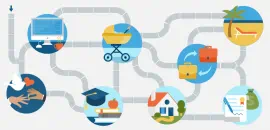

Key Takeaways
- A recession can affect your job, budget, and savings, but building good money habits may help you stay more prepared.
- Early warning signs, like job cuts, rising prices, or market drops, can signal a slowdown before it officially begins.
- Saving 3 to 6 months of expenses, cutting back on non-essentials, and paying down debt can give you more control during tough times.
- Diversifying your income and investments may help protect your finances if your main job or assets take a hit.
- Avoiding big purchases, panic decisions, and heavy credit use can help you stay steady while the economy recovers.
A recession can affect many parts of your financial life: your job, your budget, your savings, and even your plans for the future. While you can’t control the economy, you can take steps to prepare. Whether you're worried about job cuts, rising prices, or stock market swings, building smart money habits may help you feel prepared to navigate financial changes.
This content is for general education only and isn’t legal, tax, or financial advice. Consider speaking with a qualified professional about your individual situation.
What Is a Recession?
A recession is a time when the economy slows down for several months. It usually involves higher unemployment, lower consumer spending, and reduced business activity. These slowdowns are part of the normal economic cycle and can be caused by many things, like global events, financial crises, or interest rate changes.1
What Happens During a Recession?
While each recession is a little different, they often follow a pattern. Knowing the stages may help you better understand what’s going on and what to expect.
1. Early Warning Signs
Before a recession starts, there are often signs that the economy is slowing down. These can include things like rising prices, fewer new jobs, and people feeling less confident about spending. You might also see companies stop hiring or cut back on bonuses as they prepare for harder times.
2. Onset of the Downturn
Once a it hits, the economy usually starts shrinking. GDP typically declines, unemployment rises, and businesses may cut back on spending or staff. People may also cut back on discretionary purchases, focusing instead on essentials.
3. Worsening Economic Conditions
At the lowest point of a recession, more people may lose their jobs, and it can be harder to get loans or credit. Both businesses and shoppers often feel uncertain, which leads to less investment and more ups and downs in the stock market. During this time, the government or central bank may step in to help steady the economy.
4. Stabilization & Early Recovery
Eventually, the economic slowdown begins to ease up, and small signs of recovery start to appear. You might see more people getting hired or spending a little more money. To help things along, central banks may lower interest rates, and some industries slowly begin to bounce back.
5. Full Recovery
As time goes on, job numbers steady, the economy starts growing again, and the stock market often begins to recover. People feel more confident, and businesses slowly start to grow. For many families, this can be a good time to rebuild savings and think about future plans.
What Are the Most Common Signs of a Recession?
There are a few key signs that may signal a recession is happening or on the way. These include
- Falling Gross Domestic Product (GDP): This means the economy is slowing down, with less spending and production.
- More Unemployment: When companies lay people off or stop hiring, jobless numbers go up.
- Stock Market Drops: Big or steady declines in the market can show that investors are worried.
- High Inflation: Prices go up fast, and people may struggle to afford everyday things.
- Higher Interest Rates: The Federal Reserve may raise rates to fight inflation, but this can also make it harder to borrow money.
Strengthen your finances by recognizing the signs and planning early. Get My Free Financial Review
Ways to Prepare for a Recession
Evaluate & Adjust Your Budget
Regularly reviewing your monthly spending can help you identify non-essential expenses like streaming services, dining out, or entertainment. In uncertain times, it may make sense to focus more on essentials like rent, food, healthcare, and utilities. Setting up a simple “bare-bones” budget and using a budgeting app can make it easier to manage your money and stay in control.
Manage & Reduce High Interest Debt
If you have high-interest debt like credit cards or student loans, it might help to look into options like refinancing or debt consolidation. These can sometimes lower your interest rate, reduce your monthly payments, and make your debt easier to manage, especially during tough economic times. Paying down what you owe can take pressure off your budget now and may also boost your credit score over time, which could help if you need to borrow later on.
Build an Emergency Fund
Try to save enough money to cover 3 to 6 months of your basic expenses in a savings account you can easily reach. This can help if something unexpected happens, like losing your job or getting a big medical bill. Having extra cash saved up may keep you from needing to use credit cards or dip into retirement savings when money gets tight.
Prepare for the unexpected. Calculate Emergency Fund Savings Needs
Consider Asset Allocation
Spreading out your investments can help lower your risk during uncertain times. When your money is in different types of assets, a drop in one area may be balanced out by gains or stability in another.
This kind of mix can be especially useful during ups and downs in the market, since some investments tend to do better than others depending on the economy. For example, you might include a mix of:
- Mutual funds for broad market exposure
- Exchange-traded funds (ETFs) for low-cost diversification
- Index funds to track overall market performance
- Bonds to provide more stable, fixed-income returns
- Cash equivalents like money market funds for liquidity
All investing involves risk, including the possible loss of principal. Past performance is not a guarantee of future results. Diversification does not ensure a profit or protect against loss in a declining market.
Protect Your Credit Score & Bank Accounts
It's important to regularly check your credit reports for errors that could affect your score. Catching and correcting inaccuracies early may help you avoid issues when applying for credit during uncertain times. Making on-time payments, even if you're only able to pay the minimum, can also play a key role in maintaining a strong credit rating.
In addition, confirm that your bank accounts are FDIC-insured; this protection generally covers up to $250,000 per depositor, per insured bank, and can help ensure your savings remain secure during periods of financial instability.
Explore Additional Income Opportunities
To give yourself more financial stability during a recession, it may help to look for ways to earn money from more than one source. You could try freelance work, start a small side business, or even turn a hobby into extra income.
Learning new skills or taking a class can also boost your chances of getting a better or more stable job down the line. Having multiple income streams may make it easier to get through tough stretches if your main job is affected.
Common Mistakes to Avoid During a Recession
Making Major Unplanned Purchases
Big-ticket items like cars, appliances, or renovations can strain your finances during uncertain times. Unless absolutely necessary, it may help to delay large expenses until the economy stabilizes.
Overreacting to Market Volatility
Panic-selling investments during a downturn can lock in losses and disrupt your long-term strategy. Market declines are often temporary, and historically, markets recover in the long run.
Relying Too Heavily on Credit
Using credit cards to cover basic expenses may lead to rising debt and interest payments. Without a plan to pay off balances, this can become difficult to manage, especially if income is reduced.
Draining Your Retirement Account Early
Tapping into your retirement account to cover short-term needs may trigger taxes, penalties, and lost long-term growth potential. Consider this a last resort after exhausting other options.
Making Financial Decisions Without the Full Picture
When money’s tight, it might seem easier to cash out investments, skip insurance, or avoid lenders. But quick decisions like these can have long-term effects. Taking a step back to look at your full financial picture may help you stay on track.
Final Thoughts
While no one can say exactly when a recession will happen being prepared can help you feel more secure. Small, steady steps like saving, budgeting, and reducing debt may offer more control, even in uncertain times. And if you're unsure what to do next, talking to a financial professional may help you explore options that fit your situation.
Consider simple steps that could help you better prepare your finances for downturns. Get My Free Financial Review
Frequently Asked Questions
What is most needed during a recession?
How much money do I need to survive a recession?
Should I keep cash during a recession?
Sources
- National Bureau of Economic Research. "Business Cycle Dating" https://www.nber.org/research/business-cycle-dating


























